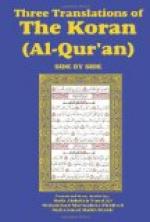Created man from clots of blood:-
Recite thou! For thy Lord is the most Beneficent,
Who hath taught the use of the pen;-
Hath taught Man that which he knoweth not.
Nay, verily,4 Man is insolent,
Because he seeth himself possessed of riches.
Verily, to thy Lord is the return of all.
What thinkest thou of him that holdeth back
A servant5 of God when he prayeth?
What thinkest thou?6 Hath he followed the true Guidance, or enjoined Piety?
What thinkest thou? Hath he treated the truth as a lie and turned his back?
What! doth he not know how that God seeth?
Nay, verily, if he desist not, We shall seize him by the forelock,
The lying sinful forelock!
Then let him summon his associates;7
We too will summon the guards of Hell:
Nay! obey him not; but adore, and draw nigh to God.8
_______________________
1 The word Sura occurs nine times in the Koran, viz. Sur. ix. 65, 87, 125, 128; xxiv. 1; xlvii. 22 (twice); ii. 21; x. 39; but it is not easy to determine whether it means a whole chapter, or part only of a chapter, or is used in the sense of “revelation.” See Weil’s Mohammed der Prophet, pp. 361- 363. It is understood by the Muhammadan commentators to have a primary reference to the succession of subjects or parts, like the rows of bricks in a wall. The titles of the Suras are generally taken from some word occurring in each, which is printed in large type throughout, where practicable.
2 This formula-Bismillahi ’rrahmani ’rrahim-is of Jewish origin. It was in the first instance taught to the Koreisch by Omayah of Taief, the poet, who was a contemporary with, but somewhat older than, Muhammad; and who, during his mercantile journeys into Arabia Petra and Syria, had made himself acquainted with the sacred books and doctrines of Jews and Christians. (Kitab al-Aghâni, 16. Delhi.) Muhammad adopted and constantly used it, and it is prefixed to each Sura except the ninth. The former of the two epithets implies that the mercy of God is exercised as occasions arise, towards all his creatures; the latter that the quality of mercy is inherent in God and permanent, so that there is only a shade of difference between the two words. Maracci well renders, In Nomine Dei Miseratoris, Misericordis. The rendering I have adopted is that of Mr. Lane in his extracts from the Koran. See also Freytag’s Lex. ii. p. 133. Perhaps, In the name of Allah, the God of Mercy, the Merciful, would more fully express the original Arabic. The first five verses of this Sura are, in the opinion of nearly all commentators, ancient and modern, the earliest revelations made to Muhammad, in the 40th year of his life, and the starting point of El-Islam. (See the authorities quoted in detail in Nöldeke’s Geschichte des Qorâns, p. 62, n.)




